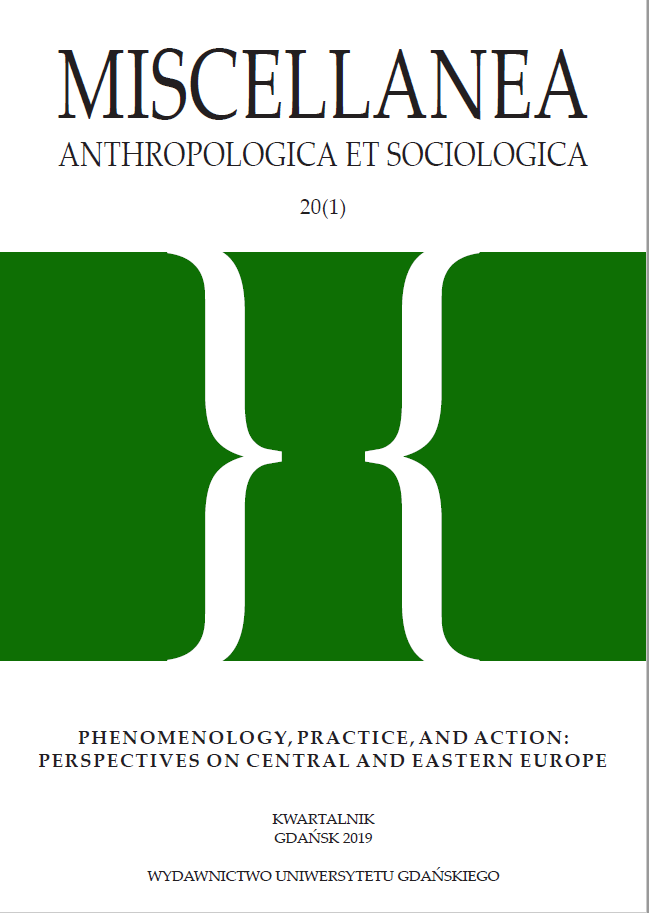Roman Ingarden: Phenomenology, Responsibility and the Ontological Foundations of Morality
DOI:
https://doi.org/10.26881/maes.2019.1.04Słowa kluczowe:
Phenomenological ontology, human nature, freedom, responsibility, structure of the worldAbstrakt
Even if Roman Ingarden did not develop an ethics stricto sensu, and although his philosophy cannot be immediately associated with a “practical turn” in phenomenology, his investigation of the essence of the real world brought him to consider the nature of man and the ontological conditions of possibility of his morally oriented actions. Without expressing normative prescriptions, and maintaining his observations in the field of eidetic description, the author felt the need to provide a foundation for ethics, inasmuch as he strived to both highlight ethical phenomenon evidence in material ontology contexts, as well as demonstrate the structural presuppositions of this phenomenon within the context of formal ontology. It is exactly this priority of ontological investigation that represents one of the most original contributions of the Polish philosopher on practical topics. The aim of this paper is to illustrate the way in which such a particular phenomenologicalontological metaethics takes shape through the theses expressed in Ingarden’s articles on human nature and responsibility.
Downloads
Bibliografia
Balaguer M., 2010, Free Will as an Open Scientific Problem, Cambridge (MA): MIT Press.
Beebee H., 2013, Free Will. An Introduction, London: Palgrave Macmillan.
Butterfield J., 1998, Determinism and Indeterminism [in:] E. Craig (ed.), Routledge Encyclopedia of Philosophy, London: Routledge.
Chrudzimski A. (ed.), 2005, Existence, Culture, and Persons: The Ontology of Roman Ingarden, Heusenstamm: Ontos Verlag.
De Santis D., 2015, Wesen, Eidos, Idea. Remarks on the “Platonism” of Jean Hering and Roman Ingarden, Studia Phaenomenologica, vol. 15 (Early Phenomenology, eds. D. Moran, R.K.B. Parker), pp. 155–180.
Fink E., 1995, Grundphänomene des menschlichen Daseins, Freiburg i. Br.-München: Alber.
Galewicz W., Ströker E., Strozewski W. (hrsg.), 1994, Kunst und Ontologie. Für Roman Ingarden zum 100. Geburtstag, Amsterdam: Rodopi.
Golaszewska M., 1976, Roman Ingarden’s Moral Philosophy, Analecta Husserliana, vol. 4, pp. 73–103.
Hartmann N., 1926, Ethik, Berlin: de Gruyter.
Hartmann N., 1949, Neue Wege der Ontologie, Stuttgart: Kohlhammer.
Hildebrand D. von, 1982, Sittlichkeit und ethische Werterkenntnis. Eine Untersuchung über ethische Strukturprobleme, Vallendar-Schönstatt: Patris-Verlag.
Husserl E., 1968, Briefe an Roman Ingarden, R. Ingarden (hrsg.), Den Haag: Nijhoff.
Ingarden R., 1964, Der Streit um die Existenz der Welt I, Tübingen: Max Niemeyer Verlag (Eng. tr. Controversy over the Existence of the World. Volume I, 2013, transl. A. Szylewicz, Bern: Peter Lang).
Ingarden R., 1965a, Der Streit um die Existenz der Welt II/1, Tübingen: Max Niemeyer Verlag.
Ingarden R., 1965b, Der Streit um die Existenz der Welt II/2, Tübingen: Max Niemeyer Verlag.
Ingarden R., 1974, Über die kausale Struktur der realen Welt, Tübingen: Max Niemeyer Verlag.
Ingarden R., 1983, Man and Value, transl. A. Szylewicz, München: Philosophia Verlag.
Ingarden R., 1998, Schriften zur Phänomenologie Edmund Husserls [in:] Gesammelte Werke, Bd. 5, Tübingen: Max Niemeyer Verlag.
Ingarden R., 2007, Essentiale Fragen [in:] P. McCormick (hrsg.), Über das Wesen, Heidelberg: Universitätsverlag Winter.
Jamieson D., 2008, Ethics and the Environment. An Introduction, Cambridge: Cambridge University Press.
Kane R., 1996, The Significance of Free Will, Oxford: Oxford University Press.
Kane R., 2005, A Contemporary Introduction to Free Will, Oxford: Oxford University Press.
Kocay V., 1995, L’Axiologie d’Ingarden, Philosophiques, vol. 22, pp. 35–52.
Küng G., 1975, Zum Lebenswerk von Roman Ingarden. Ontologie, Erkenntnistheorie und Metaphysik [in:] H. Kuhn, E. Avé-Lallemant, R. Gladiator (hrsg.), Die Münchener Phänomenologie, Den Haag: Nijhoff.
Laplace P.-S., 1995, Philosophical Essay on Probabilities, transl. from the fifth French edition of 1825 by A.I. Dale, New York: Springer.
Light A., Rolston III H., 2003, Environmental Ethics. An Anthology, Oxford: Blackwell.
Makota J., 1990, Roman Ingarden’s Idea of Relatively Isolated Systems, Analecta Husserliana, vol. 30 (Ingardeniana II: New Studies in the Philosophy of Roman Ingarden, ed. By H. Rudnick), pp. 211–223.
Pomian K. (ed.), 1990, La querelle du déterminisme. La philosophie de la science aujourd’hui, Paris: Gallimard.
Popper K.R., 1972, Objective Knowledge, Oxford: Clarendon Press.
Scheler M., 1966, Der Formalismus in der Ethik und die materiale Wertethik [in:] M. Scheler (hrsg.), Gesammelte Werke II, Bern-München: Francke.
Scheler M., 1976, Die Stellung des Menschen im Kosmos [in:] Gesammelte Werke IX, BernMünchen: Francke.
Stein E., 2004, Der Aufbau der menschlichen Person. Vorlesung zur philosophischen Anthropologie [in:] Edith Stein Gesamtausgabe 14, Freiburg i. Br.: Verlag Herder.
Swiderski E.M., 1994, Individual Essence in Ingarden’s Ontology [in:] Galewicz W., Ströker E., Strozewski W. (hrsg.), Kunst und Ontologie. Für Roman Ingarden zum 100. Geburtstag, Amsterdam: Rodopi.
Swiderski E.M., 2005, Ingarden: From Phenomenological Realism to Moral Realism [in:] Chrudzimski 2005, pp. 159–189.
Thomasson A.L., 2005, Ingarden and the Ontology of Cultural Objects [in:] Chrudzimski A. (ed.), Existence, Culture, and Persons: The Ontology of Roman Ingarden, Heusenstamm: Ontos Verlag.
Wegner D., 2003, The Illusion of Conscious Will, Cambridge (MA): MIT Press.
Wegrzecki A., 1994, The Function of Ontology and Experience in Roman Ingarden’s Axiological Investigations [in:] Galewicz W., Ströker E., Strozewski W. (hrsg.), Kunst und Ontologie. Für Roman Ingarden zum 100. Geburtstag, Amsterdam: Rodopi.

 Uniwersyteckie Czasopisma Naukowe
Uniwersyteckie Czasopisma Naukowe




